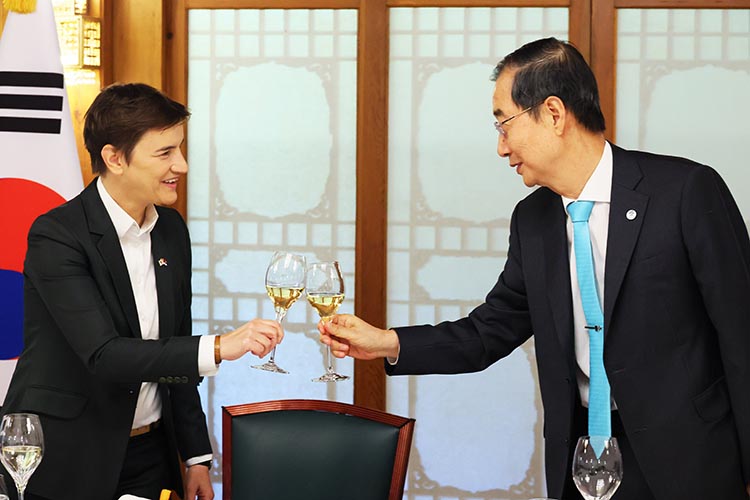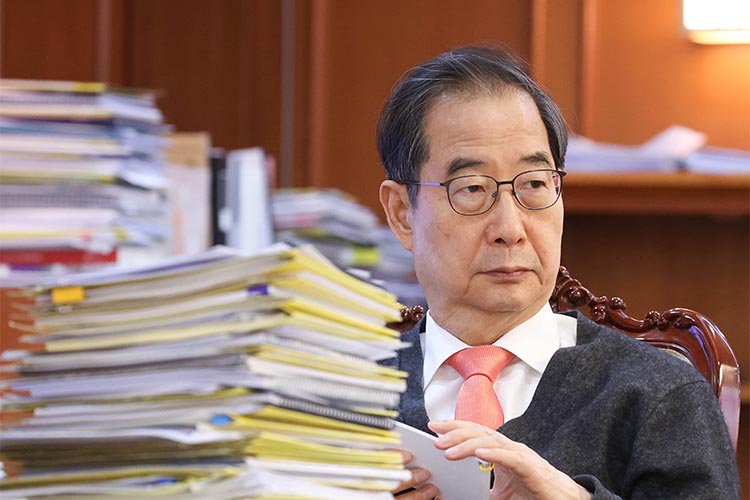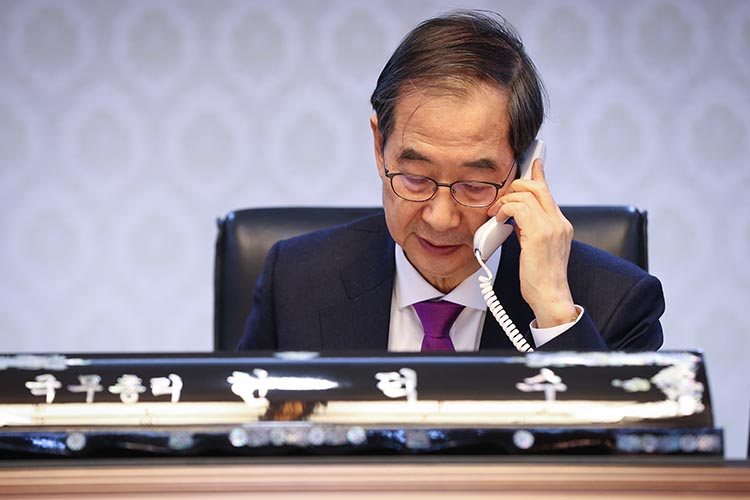Korean companies have been actively investing in Eastern European countries – in the automotive, electric vehicle battery and consumer electronics sectors – yet their investments in Serbia have not been as vibrant as in these countries. However, as competition on the Eastern European markets becomes tougher and Belgrade pursues more proactive investment policies, Serbia has gained increasing importance as a gateway to Eastern Europe
Commenting on the situation in the Western Balkans, Prime Minister Han Duck-soo says in this exclusive interview for CorD: “The stability of the Western Balkan region has a significant impact on the overall stability of Europe as a whole, especially at this juncture of global instability as a result of events like the war in Ukraine and the conflict in the Middle East. In today’s interconnected world, European security also has implications for the security of the Korean Peninsula and Northeast Asia, so South Korea is also closely monitoring the situation in the Western Balkans.”
Mr Prime Minister, could you elaborate on the key aspects of the significant recent agreement reached on mutual investment promotion and protection between Serbia and South Korea; how will it benefit both countries; how does this achievement align with your country’s broader perspective on the re-composition of global value chains and trade partnerships, and what role do South Korean business interests play in this context?
Korean companies have been actively investing in Eastern European countries, including Czechia, Poland, Hungary and Slovakia, in the automotive, electric vehicle battery and consumer electronics sectors – yet Korean investment in Serbia has not been as vibrant as it has in these countries. However, as competition on the Eastern European markets becomes tougher and Serbia pursues more proactive investment policies, Serbia has gained increasing importance as a gateway to Eastern Europe.
In this context, the signing of the Investment Protection Agreement is expected to serve as a valuable legal framework for promoting and safeguarding investments, further facilitating economic cooperation between the two countries.
Currently, 18 South Korean SMEs have established a presence in Serbia, employing approximately 2,000 people. I hope that a more diverse range of South Korean companies will enter the Serbian market in the future, further contributing to Serbia’s economic development and the diversification of our economic cooperation.
You stated in your talks with Serbian Prime Minister Ana Brnabić that you see Serbia as a hub for companies from your country to expand their European operations. What is required for that idea to achieve fruition?
As previously mentioned, the Investment Protection Agreement signed during Prime Minister Brnabić’s visit is a significant step towards bringing this to fruition. To further promote bilateral investment and trade, and establish Serbia as a hub for European markets, the next step would be the signing of the Economic Partnership Agreement (EPA).
Recognising Serbia’s geographical and economic significance, the Korean government has designated Serbia as a priority country for the initiation of the Economic Partnership Agreement.
Regarding the situation on the Korean Peninsula, Serbia has consistently condemned North Korea’s illicit nuclear missile activities and participated in all EU-imposed sanctions, supporting our government’s policies
Efforts are underway to complete the necessary domestic procedures by year’s end, facilitating the commencement of negotiations at the earliest possible date. The signing of the EPA is expected to lower or eliminate trade barriers between our two countries, including tariffs, thereby further boosting economic exchanges.
Furthermore, if Serbia achieves EU accession, which is a strategic goal of the country, I believe that investment between the two countries can be further facilitated within the framework of the existing South Korea-EU Free Trade Agreement.
Your meetings with the Serbian PM have been described as successful and important. Could you share your thoughts on how these discussions might lead to new initiatives and foreign direct investments?
Serbia and Korea have complementary economic structures. In addition to Serbia’s aforementioned strengths as an investment destination, when it comes to trade Serbia has excellent agricultural products, food items and rare minerals. On the other hand, Korea is a leading country in advanced technology sectors and is exploring new investment opportunities.
For instance, Serbia possesses a significant quantity of minerals, particularly lithium, which is crucial for the eco-friendly energy transition. South Korea boasts leading global battery manufacturers such as LG and SK. This presents opportunities for potential collaboration in the electric vehicle battery sector.

Additionally, Serbia is a major producer of grains and South Korea imports a substantial amount of Serbian corn via Romania. In this context, there is substantial potential for the two countries to enhance cooperation in food security, which is becoming increasingly important.
In conclusion, there are numerous areas in which there is real scope to enhance and nurture our cooperation in the economic realm. In this regard, the EPA and Investment Protection Agreement serve as valuable tools to define our mutual goals and take strategic steps towards achieving those goals.
You’ve mentioned that technology was noted as a priority for collaboration in your talks with the Serbian Prime Minister. Could you provide examples of specific technology sectors in which Serbia and South Korea could enhance their cooperation?
South Korea, as a leading country in advanced technology fields like ICT, has been providing support for the development of Serbia’s technological infrastructure. During the visit of Prime Minister Brnabić, the two countries discussed further enhancing shared efforts in innovative industries like smart mobility and the digital transition. Since 2019, South Korea and Serbia have maintained active collaboration regarding the implementation of Serbia’s e-government systems. South Korea established an e-government cooperation centre in Belgrade in 2020, in an effort to support the further enhancement of Serbia’s administrative systems. Additionally, two information access centres have been set up in Belgrade and Niš to facilitate ICT education for both public servants and civilians.
Serbia possesses a significant quantity of minerals, particularly lithium, which is crucial for the eco-friendly energy transition. South Korea boasts leading global battery manufacturers such as LG and SK. This presents opportunities for potential collaboration in the electric vehicle battery sector
Furthermore, it is notable that Serbia last year joined the Global Partnership on Artificial Intelligence (GPAI), demonstrating its commitment to fostering the AI industry. Serbia is a country that has established ethical guidelines for the use of AI and is known for its openness to new technologies and innovation. South Korea has also taken significant steps in this direction, forming the National Data Policy Committee under the Prime Minister’s leadership to promote data and AI technology. These efforts suggest that there are ample opportunities for both countries to further enhance their shared efforts in these related fields in the future.
What are the key issues with which our two countries can improve their cooperation at the political level?
In February of this year, a high-level policy dialogue was held between the two countries in which discussions not only covered bilateral issues, but also explored measures for political cooperation on major regional concerns.

The two countries are currently exploring avenues for shared efforts on the multilateral stage, on the basis of their close bilateral relations. In particular, regarding the situation on the Korean Peninsula, Serbia has consistSerently condemned North Korea’s illicit nuclear missile activities and participated in all EU-imposed sanctions, supporting our government’s policies.
As South Korea assumes the position of a non-permanent member of the UN Security Council in 2024, we look forward to UN-level cooperation with Serbia in dealing with global challenges like climate change, cybersecurity, the digital divide and sustainable development.
How do you view the situation in the Western Balkans and could South Korea play an active role in promoting regional stability and international cooperation in the years ahead? The Republic of Korea opted to abstain in voting on Kosovo’s entry into UNESCO three years ago. Given the experience of events that have led to today’s reality on the Korean Peninsula, how do you view unfolding events in Kosovo today?
The stability of the Western Balkan region has a significant impact on the overall stability of Europe as a whole, especially at this juncture of global instability as a result of events like the war in Ukraine and the conflict in the Middle East. In today’s interconnected world, European security also has implications for the security of the Korean Peninsula and Northeast Asia, so South Korea is also closely monitoring the situation in the Western Balkans.
Cultural exchange can represent a significant aspect of international relations. Are there any plans to intensify cultural exchange programmes between our two countries that you would like to share with our readers?
The Agreement on Cooperation in the Fields of Culture, Art and Education was signed in 2006 and a joint Committee was held in 2017, providing an institutional framework for cultural cooperation. With this as a valuable foundation, the Korean government has been steadily promoting cooperation in related fields, such as culture, art and education.
In particular, the Korean government seeks to strengthen cultural and people- to-people exchanges with Serbia through two-way cultural diplomacy. Indeed, this year, the Gyeonggi Sinawi Orchestra, a fusion orchestra, visited Serbia to present unique and diverse aspects of Korean music to the Serbian people. I believe that exchanges involving artistic groups can indeed serve to foster bonds and nurture a sense of rapport through culture. Furthermore, the Forum for Strategic Studies, a thinktank based in Serbia, and the Embassy of the Republic of Korea to Serbia held a public diplomacy debate that served to deepen trust between the two countries. Through communication with the Serbian people, academia and the media, we have developed a better and clearer shared understanding of the policies of the two countries.
In this regard, the Korean government will continue to promote cultural and people-to-people exchanges with Serbia, with a view to fostering even deeper mutual understanding. In this way, we look forward to exchanges between the two countries continuing to expand and thrive.
Looking ahead to 2024, given that global political and economic tensions haven’t eased, what are your expectations and priorities for South Korea over the coming year?
There are now mounting challenges to the rules-based international order: not least in the form of North Korea’s evolving nuclear and missile threats; Russia’s unjustifiable invasion of Ukraine; the heightened geopolitical tensions in the Indo-Pacific region; the global climate crisis; disruptions in global supply chains; and the energy crisis. The attack on Israel by Hamas has added further uncertainty and insecurity in the global community, and indeed in the global economy.
Amidst the sincere efforts to address such a ‘poly-crisis’, there is an ever-greater need to strengthen international cooperation and solidarity in order to uphold the universal values that we treasure and indeed the rules-based international order that serves to safeguard them.

Accordingly, in these times of uncertainty – this epochal tectonic shift, often referred to as ‘Zeitwende’ – the standing and role of Korea is expected to be further elevated and broadened. Indeed, there is widespread recognition of Korea’s ability to move forward to embrace the opportunities and promise of the future while safeguarding universal values.
Against this backdrop, the Republic of Korea will seek to expand its roles and responsibilities to contribute even more to upholding the rulesbased order and its underlying core values. It will do so in a wide range of areas, including the economy; science and technology; and space, among many others.
This is the vision we embrace of a Global Pivotal State (GPS) that contributes to a free, peaceful and prosperous world. It is with the aim of realising this vision of serving as a GPS that Korea announced its own Indo-Pacific Strategy last December.
Moreover, as a non-permanent member of the UN Security Council for the 2024-2025 term, Korea will work on building and sustaining global peace and security and on responding to emerging threats on the solid basis of international law and with universal values as a guiding light.
Korea’s aspiration to host the 2030 World Expo in Busan is rooted in our sense of responsibility
In response to North Korea’s heightened nuclear and missile threats, South Korea will continue its efforts aimed at completing North Korea’s denuclearisation and nurturing peace on the Korean Peninsula, while enhancing the effectiveness of extended deterrence based on the ROK-U.S. combined defence posture. Furthermore, Korea will continue to strengthen Korea-U.S.-Japan trilateral security cooperation.
The Republic of Korea will contribute activey to addressing various global issues for the betterment of humanity. In particular, drawing on the wisdom and insights gained in travelling its path of development, Korea will continue to truly fulfil a bridging role between developed and developing countries, in order to play a valuable part in fostering global co-prosperity. In this regard, Korea will continue to scale up its ODA to promote development cooperation that contributes to the realisation of global values like freedom, democracy, human rights and the rule of law.
The Korean government’s aspiration to host the 2030 World Expo in Busan is also rooted in our sense of responsibility. We are eager to share with the global community all the blessings we have received since the Korean War. Through the Busan Expo 2030, we will provide a platform for the world to explore solutions to common challenges such as climate change, economic inequality and the digital divide.
Serbia has already secured the right to host the Belgrade Expo 2027. We sincerely hope that the Busan Expo will echo this, also offering valuable windows of opportunity for deepening interaction and teamwork between our two countries, opening up new vistas in our rapport. We look forward, with the momentum generated by such an inspiring Expo, to deepening bonds of friendship between our nations. And we truly believe that this will be to the benefit of humankind more broadly.
| DENUCLEARISATION In response to North Korea’s heightened nuclear and missile threats, South Korea will continue its efforts aimed at completing North Korea’s denuclearisation and nurturing peace on the Korean Peninsula | COOPERATION We look forward to UN-level cooperation with Serbia in dealing with global challenges like climate change, cybersecurity, the digital divide and sustainable development | INNOVATION Serbia is a country that has established ethical guidelines for the use of AI and is known for its openness to new technologies and innovation |
|---|